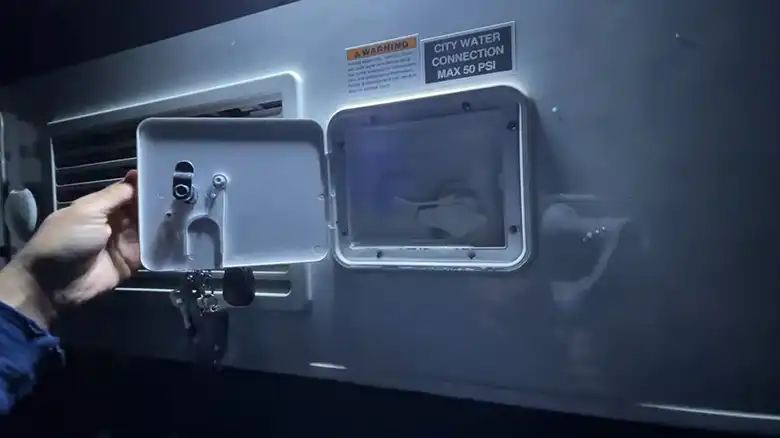RV propane detectors are essential safety devices that alert you to the presence of propane gas in your RV. Propane is a flammable gas, so it’s important to take any propane detector alarms seriously. However, there are a number of reasons why your RV propane detector might be going off, even if there isn’t actually a propane leak.
Here are some of the most common reasons why your RV propane detector might be going off:
- Cooking spray and other aerosols: cooking spray, hairspray, and other aerosol products can contain volatile organic compounds (VOCs) that can trigger your propane detector.
- Pet dander and dust: Pet dander and dust can build up on your propane detector and trigger false alarms.
In this article, we’ll explain the reason behind this common RV problem and provide actionable solutions to prevent false alarms.

Why Is Your RV Propane Detector Going Off? Common Causes
Identifying a Propane Leak and What to Do About It
A gas leak is the unintended escape of gas from a pipeline or other containment into any area where the gas should not be present. Gas leaks can be hazardous to health as well as the environment. Even a small leak into a building or other confined space may gradually build up an explosive or lethal concentration of gas. Natural gas leaks and the escape of refrigerant gas into the atmosphere are especially harmful, because of their global warming potential and ozone depletion potential.
Propane gas leaks are a common type of gas leak, and they can be particularly dangerous because propane is a flammable gas. Even a small propane leak can be enough to trigger a fire or explosion.
How Low Battery Voltage Can Trigger False Alarms
Just like your smoke detector at home, an RV propane detector relies on battery power. This means that if the battery voltage drops significantly, the detector may mistake it for a gas leak and start chirping or beeping incessantly.
This is because the sensor in the propane detector is constantly monitoring the air for the presence of propane gas. If the battery voltage drops, the sensor may become less sensitive and may trigger an alarm even if there is no gas leak.
The Impact of Dust and Debris on Your Propane Detector
Over time, dust, dirt, and debris can accumulate within your propane detector. This buildup can obstruct the sensor, causing it to malfunction and trigger false alarms. Regular cleaning can prevent this issue from bothering you.
Sensor Calibration Issues and Age of Your RV Propane Detector
RV propane detectors, like most electronic devices, have a finite lifespan. After several years of service, they may become less accurate. Additionally, sudden temperature changes or high humidity levels can affect their calibration, causing them to go off unnecessarily.
How Chemical Aerosols Can Affect Your Propane Detector
Some chemical aerosols, like those found in cleaning products or aerosol-based deodorants, can set off your propane detector. These chemicals can interact with the sensor, leading to false alarms.
Proven Solutions to Fix Your RV Propane Detector Issues
Now that we’ve identified the common reasons why your RV propane detector keeps going off, let’s dive into the solutions to ensure those annoying alarms become a thing of the past.
Gas Leak Detection and Repair
First and foremost, check for the distinct odor of propane. If you detect a leak, turn off all gas appliances, ventilate your RV, and promptly seek professional assistance to fix the leak.
Battery Replacement
Regularly replace the batteries in your RV propane detector as recommended by the manufacturer. This simple step can prevent false alarms due to low battery voltage.
Sensor Cleaning
Periodically clean the detector’s sensor and vents to remove dust and debris. Use a can of compressed air to blow away any particles that may have accumulated inside.
Sensor Replacement
If your propane detector is several years old and has seen better days, it might be time for a replacement. Modern detectors come with improved sensors and calibration, reducing the chances of false alarms.
Avoiding Aerosols
Use chemical aerosols away from the detector, ensuring proper ventilation. This simple step can prevent false alarms triggered by these substances.
Extra Tips for Maintaining Your RV Propane Detector
To keep your RV propane detector in tip-top shape, consider these bonus maintenance tips:
1. Regular Testing
- Stay vigilant: Test your propane detector regularly to ensure it’s working correctly. Follow the manufacturer’s instructions for testing procedures.
2. Install a Carbon Monoxide Detector
- Double protection: In addition to your propane detector, consider installing a carbon monoxide detector in your RV. Carbon monoxide is another potentially life-threatening gas that may go undetected without a specialized sensor.
3. Ventilation
- Keep it fresh: Proper ventilation is key to preventing gas buildup. Ensure your RV has adequate ventilation to disperse any potential gas leaks.
4. Professional Inspection
- The expert touch: Schedule an annual inspection of your RV’s propane system by a qualified technician. They can check for leaks, assess the overall system, and ensure your safety on the road.
5. Stay Informed
- Knowledge is power: Educate yourself and your travel companions about the proper use of propane appliances and safety measures. Awareness can go a long way in preventing accidents.
Now that you’re armed with the knowledge of why your RV propane detector keeps going off and how to tackle the issue, you can enjoy your road trips with peace of mind. Remember, safety is paramount, and addressing these concerns promptly can make all the difference.
Conclusion
When it comes to RV adventures, your safety and peace of mind should always be top priorities. If your RV propane detector keeps sounding an alarm, it’s important to take action. This article provides actionable solutions to help you understand why those alarms are going off unexpectedly. From detecting gas leaks to maintaining your detector and staying informed, you now have the necessary tools to ensure that your journeys are both enjoyable and safe.
If you have any additional questions or uncertainties regarding RV propane detectors or any other RV-related topics, please feel free to leave a comment below. We are here to assist you in making the most of your RV experiences. Thank you for reading, and we wish you safe travels!


